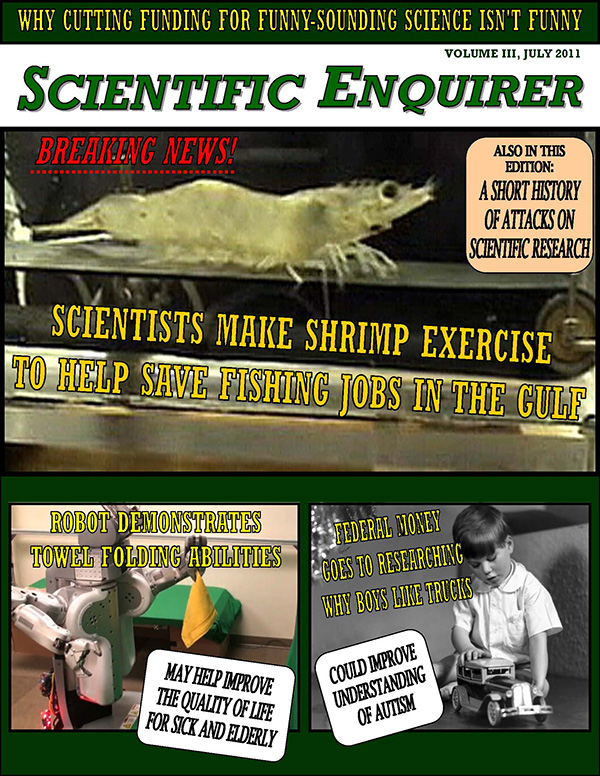 It’s easy to make fun of things you don’t understand. That is particularly true of scientific research. In fact, making fun of federally funded science projects has become an unfortunate political tradition.
It’s easy to make fun of things you don’t understand. That is particularly true of scientific research. In fact, making fun of federally funded science projects has become an unfortunate political tradition.
The Association of American Universities has taken up the challenge of defending publicly ridiculed science projects with a new publication titled “AAU’s Scientific Enquirer.” It takes the sensationalized headlines ripped out of the tabloids or political tracts that make fun of individual research projects and explains why they are worth supporting.
In its July issue, for example, Scientific Inquirer addresses recent criticism of research that puts shrimp on an underwater treadmill to determine how they respond to stress. The project is one of a number of projects that Oklahoma Senator (R) Tom Coburn described as a waste of taxpayer money in a scathing report on the National Science Foundation that he issued in May. Coburn’s criticism has also been echoed by a television ad produced by AARP urging seniors to tell politicians to cut “billions in waste and loopholes” instead of cutting their Social Security and Medicare benefits.
No doubt AARP and Coburn’s staff selected the shrimp study because a video from the project went viral three years ago after one of the researchers posted it on his university website. Currently there are more than 70 versions of the “running shrimp” video, many set to inspiring music such as the themes to the movies “Chariots of Fire” and “Rocky.” The most popular version is accompanied by the theme from Benny Hill.
http://www.youtube.com/watch?v=cMO8Pyi3UpY
The Scientific Enquirer’s headline is “Shrimp on Treadmills: Racing to Save Marine Life and Support the U.S. Fishing Industry.” The article states: “It turns out that, outside of the video, there is nothing funny about this research. In fact, this is a serious, peer-reviewed project aimed at understanding marine ecology and protecting the livelihoods of fishermen who depend upon the ocean’s bounty…. In many places, including the Gulf, shrimp and other shellfish are subject to significant environmental stresses, potentially threatening both the marine ecosystem and key elements of the fishing industry. Oxygen depletion, also known as hypoxia, is a primary concern for these crustaceans….. In their natural ocean environments, shrimp live in moving water, which requires them to move constantly in order to survive. So these scientists wanted to know how hypoxia, in combination with a decline in the shrimp’s immune defense against bacteria, interferes with their ability to move.”
Coburn’s criticsm of the running shrimp experiment is strikingly similar to the attack that the late Wisconsin Senator (D) William Proxmire made in the 1970’s on a US Department of Agriculture financed project that studied the mating habits of the screwworm, a major agricultural pest. The research, which originally cost about $250,000, ultimately saved the U.S. cattle industry more than $20 billion.
The new AAU publication is an upbeat attempt to address a serious problem. In a period when the political forces are aligned to cut back federal spending of all kinds, government support of basic research is under attack from many quarters and one of the most effective means the attackers have to discredit science is to make fun of it.